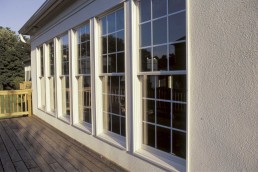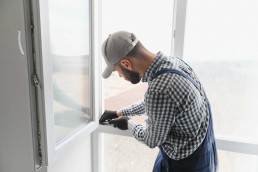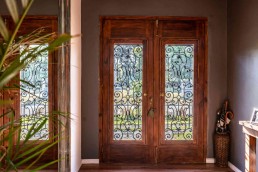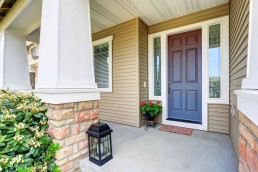Comparing Vinyl Windows with Wood Windows: Which is Better for Your Home?
When it comes to selecting windows for your home, particularly during window replacement projects, the choice often comes down to comparing materials that will best suit your aesthetic desires and functional needs. Among the myriad of options, vinyl and wood windows stand out for their unique benefits and drawbacks. Understanding these can help you make an informed decision tailored to your specific home environment.
Vinyl Windows: Affordable and Low Maintenance
Vinyl windows are known for their durability and cost-effectiveness. Made primarily from PVC (polyvinyl chloride), these windows require little maintenance and are resistant to moisture, making them a great option for many Canadian homes. They do not need painting or sealing, which significantly reduces upkeep efforts over time.
One of the most significant advantages of vinyl windows is their energy efficiency. With good insulation properties, they can help reduce heating and cooling costs. However, vinyl is not without its limitations. The material can expand and contract significantly with temperature changes, which may affect long-term durability. Additionally, options for colours and styles are more limited compared to wood, potentially restricting your design choices.
Wood Windows: Naturally Aesthetic and Customizable
Wood windows offer a timeless look that can enhance the natural appeal of any home. They are highly customizable, available in a variety of styles and finishes, which makes them particularly attractive for owners of traditional or historical homes. Moreover, wood can be an excellent natural insulator.
However, wood windows come with higher maintenance requirements. They need to be regularly painted or stained to prevent weather damage such as warping or rotting. This material can be more expensive not only in terms of initial cost but also in ongoing maintenance. Despite these costs, the aesthetic appeal and potential to increase a property's value make wood an appealing choice for many homeowners.
Comparative Considerations
Durability and Lifespan: Vinyl typically lasts longer without the need for repairs, while wood may suffer from environmental effects but can last decades if properly maintained.
Energy Efficiency: Both vinyl and wood provide good insulation, but the quality can vary depending on the manufacturing and installation.
Aesthetic and Design Flexibility: Wood wins in terms of aesthetic flexibility and potential to match with a home's historic character. Vinyl, while limited in appearance, offers a modern look that suits many contemporary designs.
Cost Comparison: Initially, vinyl is more cost-effective, but wood might offer better long-term value by increasing the resale value of the home.
Making the Right Choice
The decision between vinyl and wood windows often comes down to personal preference and specific needs. Consider the following factors:
Climate: In harsher climates, the superior insulation properties of vinyl might be more beneficial.
Home Style: Wood windows may be the better choice for historic or custom-designed homes where aesthetics are a priority.
Budget: If initial cost and low maintenance are key concerns, vinyl could be the more suitable option.
Making the Best Choice
Both vinyl and wood windows offer compelling benefits for homeowners, and understanding the benefits of replacing windows can guide your decision. Your choice will depend on your home’s style, your budget, and how much maintenance you’re willing to undertake. Vinyl windows might be the way to go for those seeking a cost-effective, durable option with less upkeep. Conversely, if you’re looking to enhance the traditional charm of your home and increase its value, wood windows are an excellent investment, albeit with more maintenance.
When selecting windows, consider how they will fit with the overall design of your home and what practical benefits they will bring in the long run. Whatever you choose, make sure it aligns with both your immediate needs and your long-term living environment goals.
Understanding the Role of Inert Gas in Window Performance
In the quest for energy-efficient homes, modern window technologies have evolved significantly, becoming crucial components in reducing energy costs and enhancing comfort. Among these advancements, the use of inert gas in window construction represents a leap forward in window performance. If you are considering using this advancement for your window replacement, well, this blog post is for you. It delves into the role of inert gas in windows, explaining its benefits and providing insights into choosing the right gas for your needs.
Basics of Window Construction
Modern windows are often double or triple-glazed, featuring two or three panes of glass, respectively, to improve insulation. The materials used in window frames and glass play a vital role in their performance, but the secret ingredient to their efficiency lies in the space between these panes. This space is filled with inert gas in insulated glass units (IGUs), significantly enhancing the window's thermal performance.
What is Inert Gas?
Inert gases, such as Argon, Krypton, and Xenon, are non-reactive gases that offer better insulation than regular air. These gases are chosen for their excellent thermal performance, which stems from their higher density compared to air, reducing the convective currents within the window and, consequently, the heat transfer.
Benefits of Inert Gas in Windows
The introduction of inert gas in windows brings several benefits:
Thermal Insulation: By reducing heat transfer, inert gas lowers energy bills and enhances indoor comfort.
Noise Reduction: The density of inert gases also contributes to sound insulation, making your home quieter.
UV Protection: Special coatings on IGUs can work with inert gases to minimize harmful UV radiation, protecting interiors from sun damage.
Longevity and Durability: Inert gas can extend the lifespan of windows by preventing condensation and maintaining thermal performance.
Comparing Different Types of Inert Gases
Argon is widely used due to its cost-effectiveness and good thermal performance.
Krypton offers enhanced thermal efficiency in narrower spaces, making it ideal for triple-glazed windows.
Xenon, though less common, provides superior insulation but at a higher cost.
Choosing the right inert gas depends on the space between panes, window size, and local climate conditions.
Installation and Maintenance
Professional installation is crucial to ensure the inert gas remains sealed within the IGU. Signs of seal failure include condensation between panes. Regular maintenance and inspections can help prolong the effectiveness and lifespan of inert gas-filled windows.
Cost vs. Benefit Analysis
While the initial cost of inert-gas-filled windows may be higher, the long-term energy savings can be significant. These windows offer an excellent return on investment (ROI), especially in extreme climates, and contribute to environmental conservation by reducing energy consumption.
Unlock the Secret to Comfy, Efficient Homes: The Power of Inert Gas in Your Windows
Inert gas plays an important role in enhancing window performance. By understanding the benefits and considerations of different inert gases, homeowners and commercial property owners can make informed decisions to maximize comfort, efficiency, and value. We encourage consulting with professionals to find the best window solutions tailored to your specific needs, ensuring that your investment today pays dividends in energy savings and comfort for years to come.
A Guide to Weather Stripping for Windows: Types, Installation, and Benefits
Do you ever feel a chill by the window even when the heat is cranked up? Or maybe you hear a constant whistle of wind during storms? Drafty windows can be a major source of discomfort and energy inefficiency in your home. While replacing windows altogether can be a solution, it's often a costly and time-consuming project.
This is where weather stripping comes in! A simple and affordable solution, weather stripping can significantly improve the performance of your existing windows. Before considering a full window replacement, this guide will equip you with the knowledge to tackle weather stripping yourself. However, if you're not comfortable with DIY projects, there are always reputable windows and doors contractors who can handle the installation for you.
This guide will delve into the different types of weather stripping available, how to choose the right one for your windows, and the easy installation process. By the end, you'll be well on your way to a more comfortable, energy-efficient, and quieter home!
When it comes to choosing the right weather stripping for your windows, there are several options available, each with its own advantages and considerations. Here's a breakdown of the most common types:
Self-adhesive Foam:
Pros: This is the easiest type to install thanks to its handy adhesive backing. It's also the most affordable option, making it a good choice for minor gaps around windows.
Cons: Unfortunately, self-adhesive foam isn't the most durable solution. It may compress over time and lose its effectiveness, potentially needing replacement every few years.
Pile Weather Stripping:
Pros: For larger gaps around windows, pile weather stripping offers a reliable seal. It's also a good choice if you're looking to block dust and allergens from entering your home. The fluffy pile creates a tight barrier.
Cons: Installation requires a groove in the window frame to accommodate the pile. This type of weather stripping might not be the most aesthetically pleasing for all window styles, especially modern ones.
V-strip Weather Stripping (Tension Seal):
Pros: Offering a balance of durability and low profile, V-strip weather stripping is a popular choice for double-hung and sliding windows. This metal or plastic strip forms a V-shape that springs open to bridge gaps and create a seal.
Cons: V-strip requires a flat surface for installation on the window frame. Installing it might be trickier compared to self-adhesive options.
Brush Weather Stripping:
Pros: For windows that are particularly drafty or prone to dust infiltration, brush weather stripping provides excellent protection. The brush bristles effectively block drafts and dust particles from entering your home.
Cons: Due to the constant friction, brush weather stripping may wear out faster than other types and require periodic cleaning to maintain effectiveness.
Metal Weather Stripping:
Pros: The most durable option on this list, metal weather stripping is often used on commercial buildings due to its long lifespan. Made from materials like bronze, aluminum, or stainless steel, it provides a very strong and lasting seal.
Cons: Metal weather stripping typically requires professional installation due to its rigidity and the potential need for specialized tools. Additionally, the industrial look might not be suitable for all window styles, particularly in residential settings.
With a variety of weather-stripping options available, selecting the best one for your windows requires considering a few key factors:
Gap Size: First and foremost, assess the size of the gaps around your windows. Self-adhesive foam works well for minor gaps (less than 1/16 inch), while pile weather stripping is ideal for larger gaps (up to 1/4 inch). Brush and V-strip can handle a wider range of gap sizes (up to 3/8 inch). Metal stripping, due to its rigidity, is best suited for minimal gaps.
Window Style: The type of window you have will influence your choice. For instance, V-strip excels with double-hung and sliding windows, while pile weather stripping might be better suited for casement windows with grooves to accommodate it.
Desired Durability and Aesthetics: Consider the trade-off between longevity and visual appeal. Self-adhesive foam is easy to install but requires frequent replacement. Pile weather stripping offers good durability but might not be the most attractive option. Metal stripping provides the longest lifespan but may not complement all window styles. Brush and V-strip offer a balance between functionality and aesthetics.
Remember, this is just a general guide. It's always recommended to consult the manufacturer's recommendations for specific products if you are installing the new weather-stripping on your own or consulting with your windows and doors contractor if you choose to have a professional install the weather-stripping.
Weather stripping installation is a relatively straightforward process that can be tackled by most DIY enthusiasts. Here's a general outline of the steps involved.
General Steps:
- Clean the window frame surface thoroughly with soap and water. Remove any dirt, dust, or debris that might hinder the adhesive's bond. Dry the surface completely before proceeding.
- Carefully measure the area where the weather stripping will be applied. It's always better to err on the side of caution and cut a slightly longer piece. You can always trim the excess later. Use a sharp utility knife or scissors to cut the weather stripping to the desired length.
- Following the specific instructions provided with your chosen weather-stripping product, apply it to the designated area on the window frame. For self-adhesive options, simply peel off the backing and press the strip firmly into place. Other types might require tapping them into grooves or using fasteners (consult the product instructions).
- Testing and Adjustments: Once the weather stripping is installed, close and open the window a few times to ensure it doesn't interfere with the window's operation. Check for any gaps or areas where the seal might be compromised. Adjust or minor trimming as needed.
Note: When handling metal stripping, wear gloves to avoid cuts. Be mindful of sharp edges on tools like utility knives and use caution while cutting. If you're unsure about any aspect of the installation process, consult a professional or refer to the manufacturer's instructions for detailed guidance.
Weather stripping offers a multitude of advantages for your home, making it a worthwhile investment, including:
Slash energy bills: Seal drafts and maintain consistent temperatures, saving on heating and cooling costs.
Boost comfort: Eliminate drafts for a more enjoyable indoor climate year-round.
Quiet your home: Reduce outside noise pollution for a peaceful environment.
Breathe easier: Block dust, pollen, and allergens from entering.
Potentially increase home value: Showcase energy efficiency, a perk for potential buyers.
Drafty windows can be a thing of the past! Weather stripping is a simple, cost-effective solution that can significantly improve your home's comfort, energy efficiency, and overall value. By following the steps outlined in this guide, you can tackle weather stripping installation yourself. However, if you're more comfortable leaving it to the professionals, reputable windows and doors contractors are readily available to help with your project. Regardless of the installation method you choose, weather stripping offers a multitude of benefits, making it a worthwhile investment for any homeowner. So, why wait? Grab some weather stripping today and enjoy a more comfortable, energy-efficient, and quieter home!
A Touch of Tradition: The Timeless Appeal of Wooden Entry Doors
When deciding on a new look for the windows and doors of your beloved home, wooden entry doors stand as a solid choice. Wooden entry doors are full of character and present a timeless and classic look for your home. They are inviting, and valuable, and ensure that your home stands out as a masterpiece along your curb. Let's delve deeper into these timeless appeals below.
Wooden Entry Doors Are Versatile
The timeless charm of wooden entry doors lies in their celebrated versatility, a quality deeply rooted in the natural characteristics of wood and the artistry involved in their crafting. What makes this happen is the innate potential of wood as a material for a wide range of design possibilities.
Wood is a malleable material so it can be shaped and carved to your liking. Making it match your home’s architectural design or turning it into a centrepiece is not impossible. Whether you lean towards a classic, rustic, modern, or eclectic aesthetic, wooden doors can be fashioned to seamlessly blend with the overall look of your home.
The expansive choice of wood species also contributed to the versatility of wooden entry doors. Each species boasts a distinctive grain pattern, colour, and texture, giving you the freedom to pick the wood that perfectly complements your preferences and home style. From the opulent tones of mahogany to the lighter hues of oak, the array of wood options allows for a personalized and customized approach to design.
Lastly, the adaptability of wooden doors extends to their ease of staining or painting, providing even more flexibility in terms of colour choices. This simplifies the process of matching the door to your home's exterior colour scheme or making adjustments as your design preferences evolve over time.
Wooden Entry Doors Are Durable
Beyond just being visually appealing, the enduring strength of wood plays a pivotal role in its timeless appeal. Top-notch wooden doors, given the right care, can withstand the tests of time, standing firm against the forces of wear and tear. This resilience not only ensures a lasting investment but also allows the door to gracefully age, developing a unique patina that enhances its character over the years.
An essential factor contributing to this durability is the inherent strength of wood as a natural material. With a history of being used in construction for centuries, wood is renowned for its powerful yet flexible qualities. When thoughtfully selected and treated, certain wood species showcase remarkable resistance to wear and tear, making them ideal for exterior applications such as entry doors.
The craftsmanship and construction quality behind wooden entry doors also play a role in their durability. Meticulously assembled doors are made with precision that gives them structural integrity and enduring strength.
Moreover, the durability of wooden entry doors hinges on the application of protective finishes to the wood. Strategic sealing and finishing methods, including varnishes, stains, or paints, create a shield against the elements.
These finishes act as a barrier, preventing moisture infiltration—a critical aspect in averting issues like warping, rotting, or insect damage. Regular maintenance, such as resealing or refinishing as needed, becomes a key practice to further extend the door's lifespan.
Wooden Entry Doors Give A Natural Feel
Lastly, the natural feel of wooden entry doors is also a part of their enduring charm and timeless appeal. There are several aspects of this natural quality that make wooden doors particularly enticing for homeowners.
The first one is the tactile experience of touching wood, which creates a connection to nature unparalleled by other materials. Wood possesses a warmth and organic quality that resonates with our senses, offering a tangible and comforting feel. Running your hand over the grain of a wooden door can give you a profound sense of authenticity and craftsmanship, elevating the overall sensory experience of entering your home.
Adding to this appeal are the natural variations in wood grain patterns and textures. Each wooden door is a unique masterpiece, adorned with distinct markings, knots, and lines. The individuality of each wooden entry door gives them character, making it a standout feature in your home. The imperfections and irregularities in the wood grain tell a story of the tree's growth, further accentuating the natural origins of the material.
Embrace The Charm That Lasts
Now that you know the timeless beauty of wooden entry doors, it’s time to make a choice. Their natural warmth, unique textures, and enduring appeal bring a touch of authenticity to your home. With durability and customization options, wooden doors are not just an entrance; they're a statement reflecting your style and a connection to the beauty of nature. Elevate your home with the classic allure of wooden entry doors – where functionality meets enduring aesthetics.
Which Entry Door is Best for Enhancing Energy Efficiency?
In the quest for a more energy-efficient home, every component plays a pivotal role, and this extends to your entry door. Far more than just a means of security or a component of your home’s curb appeal, the entry door is instrumental in maintaining internal temperatures and contributing to the overall energy efficiency of your space. It acts as a barrier, not just against intruders, but against the whims of the weather, keeping the cold out in winter and the heat at bay during summer. Understanding this role is the first step in appreciating why the choice of an entry door is crucial for energy conservation.
Yet, the question arises – what exactly elevates a door from being merely functional to being energy efficient? Is it the material, the design, or perhaps something less visible to the eye? As we delve into the world of entry doors, we unravel the features that define their efficiency. It’s not just about selecting a door that complements the aesthetic of your home; it’s about choosing one that aligns with your energy-saving goals. So, let’s embark on a journey to unlock these secrets and understand what makes one door more energy-efficient than another.
Understanding Energy Efficiency in Doors
An energy-efficient door is much more than a simple entryway; it serves as a critical seal against varying external weather conditions. By effectively maintaining your home’s internal temperature, it reduces the burden on your heating and cooling systems. This pivotal role directly translates into tangible benefits: lower energy bills and a consistently comfortable living environment. The effectiveness of a door in this regard is determined by several factors. Material and insulation properties are at the forefront, with weather stripping playing an essential role in preventing drafts and energy leaks. Together, these elements form a barrier that keeps the outside elements at bay, while preserving the internal climate of your home.
Understanding the technical aspects of an energy-efficient door is key to making an informed decision. Two important metrics come into play here: the door’s R-value and U-factor. The R-value measures the door’s resistance to heat flow, with a higher R-value indicating better insulating properties. On the other hand, the U-factor denotes the rate at which a door conducts non-solar heat flow. A lower U-factor is preferable, as it signifies a door’s greater ability to act as a barrier against heat transfer. These metrics provide a clear, quantifiable way to assess a door’s energy efficiency, guiding homeowners in selecting a door that not only looks good but also performs excellently in terms of energy conservation.
Types of Energy-Efficient Doors
Wood Doors
Wooden doors, known for their classic appeal, do come with certain considerations regarding energy efficiency and maintenance. While they can provide good insulation, they are not as energy-efficient as steel or fiberglass doors. However, their efficiency can be enhanced through proper installation, which includes caulking and weatherstripping, and by adding a storm door. In terms of maintenance, wooden doors require regular painting or varnishing to protect them from the elements, with more frequent care needed in harsh climates. Despite these maintenance needs, they are highly customizable and complement various house styles.
Steel Doors
Steel doors are recognized for their strength and security, but they also offer excellent insulation, primarily due to their foam core. This feature makes them a strong contender in terms of energy efficiency. They are durable and have a high resistance to warping, which contributes to their long-term performance and efficiency. Steel doors are also low maintenance compared to wooden doors and can effectively withstand extreme weather conditions, making them a practical choice for many homeowners.
Fiberglass Doors
Fiberglass doors stand out as the most energy-efficient option among the three. They are equipped with insulated cores, providing superior thermal insulation. This quality makes them particularly effective in maintaining a home’s internal temperature, leading to energy savings. Additionally, fiberglass doors are resistant to weather-related wear and tear, making them a durable option in various climatic conditions. Their low maintenance requirements, coupled with their high energy efficiency, make them an ideal choice for homeowners looking for a long-term, cost-effective solution.
Each type of door has its unique characteristics and suitability depending on a homeowner’s specific needs and preferences. It’s important to balance factors like aesthetic appeal, energy efficiency, maintenance requirements, and durability when choosing the right door for your home.
Additional Features to Consider
The true effectiveness of an energy-efficient door extends beyond its construction and materials; the installation process plays a crucial role in its overall performance. Even a door designed with the best energy-saving features can fall short if it’s poorly installed. Incorrect installation can lead to gaps and spaces that allow for air leaks, diminishing the door’s ability to maintain a stable indoor temperature. This is why ensuring a professional and precise installation is as important as choosing the right door. A properly installed door aligns perfectly with its frame, leaving no room for air infiltration, thereby optimizing its energy efficiency.
Another factor that significantly influences a door’s energy performance is the type of glass used in its design. Doors with glass inserts, like those with double or triple-glazed panes, significantly enhance energy efficiency. These panes, especially when treated with low-emissivity (low-E) coatings, are effective in minimizing heat transfer, thus maintaining the internal temperature more effectively. Additionally, the design of the door’s framing and threshold is paramount in preventing air leakage. The right threshold design ensures a tight seal when the door is closed, while quality framing supports the door structure, both crucial in eliminating unwanted air flow and maximizing the door’s energy efficiency.
How to Choose the Right Door
Choosing the right energy-efficient door for your home is a decision that blends both aesthetics and functionality. Start by considering the specific climate conditions of your area; different materials and door types may perform better in certain climates. For instance, fiberglass doors might be more suitable for areas with extreme weather conditions due to their high resistance to weather-related wear and tear. Additionally, the architectural style of your home should guide your choice – a modern home might benefit from a sleek, steel door, while a traditional home may look best with a classic wooden door. Your personal energy-saving goals are also crucial in this decision. Aiming for a high level of energy efficiency might lead you towards doors with higher insulation values or advanced features like low-E glass inserts.
Consultation with professionals is invaluable in this process. Door specialists or home energy auditors can offer tailored advice based on your home’s specific needs. They can help you navigate through the options, considering factors like door orientation (which affects exposure to elements), potential maintenance requirements, and long-term energy savings. This expert insight ensures that the door you select is not only visually pleasing but also aligns with your home’s energy efficiency objectives, ultimately contributing to a reduction in energy costs and an increase in indoor comfort. Remember, the right door is a crucial component in your home’s overall energy management strategy.
Choosing the right entry door is more than just a design decision; it’s a step towards a more energy-efficient and cost-effective home. By understanding the different types of doors and their features, you can make an informed choice that meets both your aesthetic and practical needs.
Say Goodbye to Maintenance Headaches: The Easy Care of Replacement Windows and Doors
Any homeowner would benefit from replacing outdated, draughty windows and doors with energy-efficient ones. However, it is critical to properly care for these new installations in order for them to continue to function at their peak. Here are six suggestions for maintaining replacement windows and doors.
Clean Regularly
Any homeowner may benefit from replacing outdated, draughty windows and doors with energy-efficient ones. However, adequate care and maintenance are required to guarantee that your new windows and doors continue to work well. Cleaning your replacement windows and doors on a regular basis is one of the most important things you can do to care for them. Cleaning on a regular basis is necessary for a variety of reasons. For starters, it helps to keep the look of your windows and doors. Dirt, dust, and other debris can accumulate on the surface of the glass and frame over time, making them appear dingy and unpleasant. Cleaning your replacement windows and doors on a regular basis can keep them looking new and will improve the exterior appeal of your property. Regular cleaning is also necessary to keep your windows and doors in good working order. Dirt and debris can collect in your windows' and doors' tracks and other moving parts, causing them to stick or perform less smoothly. By cleaning these areas on a regular basis, you can avoid buildup and guarantee that your windows and doors continue to function properly. Regular cleaning, in addition to preserving look and functioning, can assist to increase the lifespan of your new windows and doors. Dirt and debris can scratch and damage the glass and frames, compromising their structural integrity. By eliminating these impurities on a regular basis, you may help prevent damage and extend the life of your windows and doors. It is essential to utilise the proper cleaning procedures and supplies while cleaning your new windows and doors. Avoid using abrasive or strong chemicals that might harm the coating or sealant on your windows and doors. Instead, gently wash down the surfaces with a soft cloth or sponge with a mild, non-abrasive cleanser. To avoid streaks and water marks, properly rinse with clean water and dry the surfaces with a soft towel.
Check Weatherstripping
Weatherstripping is critical to the successful operation of replacement windows and doors. It is the material that fills the space between the window or door frame and the aperture, keeping air and moisture out and in. Checking the weatherstripping on your new windows and doors on a regular basis is an important step in maintaining them. Weatherstripping can deteriorate with time, making it less effective and enabling draughts and moisture to enter. As a result, it's critical to inspect the weatherstripping on a frequent basis. It is time to replace it if it is cracked, peeling, or missing. Replacing weatherstripping is a simple and cost-effective approach to keep your windows and doors energy efficient. Sealing gaps can help prevent air leaks and energy loss, saving you money on your utility costs. Furthermore, weatherstripping can aid with noise reduction, making your house more tranquil and pleasant. It is critical to select the proper type of weatherstripping for your windows and doors. Rubber, foam, and silicone are among the materials offered. Each has its own set of advantages, including durability, flexibility, and tolerance to harsh temperatures. Checking and replacing weatherstripping, in addition to preserving energy efficiency, may extend the life of your new windows and doors. Moisture and air can enter the frame and cause damage, such as rot, corrosion, or warping, if gaps are not filled. You may avoid these problems and extend the life of your investment by maintaining the weatherstripping in good shape.
Lubricate Moving Parts
Lubricating the moving parts of your new windows and doors is an important aspect of preventative maintenance that may assist maintain maximum operation and the durability of your investment. Because of constant usage and exposure to the environment, moving parts such as hinges, tracks, and rollers can wear out over time. Lubrication can assist to reduce wear and tear and keep your windows and doors running smoothly. By lubricating the moving parts on a regular basis, you can decrease friction, which can harm the hardware and surrounding surroundings. Friction can lead to early failure and the need for costly repairs by causing extra pressure on the motor or crank. Proper lubrication can also help prevent irritating squeaking or grinding noises, which can be bothersome. For window and door maintenance, lubricants such as silicone-based lubricants and light oils are available. These lubricants are designed particularly for use on window and door hardware and are typically safe to use on most materials. However, excessive oils and grease should be avoided since they can collect dirt and debris, resulting in obstructions or damage. It is critical to use oil carefully and avoid over-application while lubricating your replacement windows and doors. Excessive lubrication can attract dirt and debris, causing blockages or damage. It's also critical to keep the lubricant to the moving parts and away from other surfaces like glass or frame.
Ventilation
It is important to keep your new windows and doors well-ventilated in order to properly care for them. Proper ventilation helps to keep your windows and doors structurally sound while also reducing moisture buildup, which may cause damage and deterioration. When your windows and doors are closed for long periods of time, humidity and moisture can accumulate inside your house. Condensation can accumulate on the surfaces of your windows and doors, causing water damage, mould growth, and a range of other problems. Excess moisture in the air can also cause wood frames and trim to distort or rot. You may avoid these problems by keeping your replacement windows and doors well-ventilated. Proper ventilation aids in the regulation of moisture in the air, lowering the danger of condensation and other types of water damage. Furthermore, ventilation can aid in the prevention of the accumulation of indoor pollutants such as allergens and chemicals, which can be damaging to your health. Open them often to maintain your new windows and doors well-ventilated. On moderate days, opening your windows and doors allows fresh air to circulate throughout your home, reducing humidity and minimising moisture buildup. Using a window or door fan can also assist to promote air circulation, lowering the danger of moisture buildup and damage. It is also critical to keep your windows and doors well-sealed while closed. Check for worn weatherstripping and that any cracks or holes around the frames are adequately sealed. This will assist to minimise draughts and limit the likelihood of moisture buildup.
Check for Damage
Replacement windows and doors are an important investment for any homeowner because they provide several benefits such as greater energy efficiency, improved aesthetics, and higher property value. These installations, like any other component in your home, can experience damage over time due to a variety of circumstances such as weather, wear and tear, and accidents. It is important to inspect replacement windows and doors for damage on a regular basis in order to properly care for them. The first reason that inspecting replacement windows and doors for damage is vital is that it helps avoid future problems. Cracks, dents, and warping can threaten the integrity of the window or door and impair its operation. A fracture in a window glass, for example, might enable air leakage, reducing your home's energy efficiency and increasing your energy expenditures. Furthermore, if the fracture is not treated, it can grow and lead to full window failure, resulting in costly repairs or replacements. Another reason to inspect for damage is to keep your new windows and doors looking nice. Damages can distract from your home's overall appeal, making it appear untidy or badly kept. Regularly examining your windows and doors and swiftly correcting any issues will help keep them looking fantastic and boost the exterior appeal of your property. Damage inspection can also assist in identifying potential safety issues. A broken door lock or hinge, for example, might impair your home's security and make it simpler for burglars to obtain inside. A fractured glass might break abruptly, endangering anybody around. Regularly inspecting for deterioration will help you detect and fix these safety dangers before they become major issues.
In conclusion, appropriate replacement window and door care and maintenance are critical to guaranteeing their longevity and functionality. Cleaning on a regular basis, inspecting weatherstripping, lubricating moving components, keeping them well-ventilated and inspecting for damage are all important measures for caring for your investment. It is also recommended to employ a professional for maintenance, as well. By following these guidelines, you will be able to enjoy energy-efficient and attractive windows and doors for many years to come.
5 Questions To Ask When Choosing Replacement Windows
Introduction
Purchasing new window frames is not something that many of us do on a regular basis. As a result, we never have a true understanding of how to execute it successfully. Smart homeowners, on the other hand, constantly ask the following 5 questions when considering window replacement:
1. What Is The Material Of This Sash And The Window Pane?
In today's world, there are many various materials that may be utilized to make windows. Vinyl, wood, aluminum, and composite materials are examples of them. Each substance has its own set of advantages and disadvantages. Before you reach a choice, think about your requirements.
2. What Are All The Benefits And Drawbacks Of Using These Materials In Our Weather?
Vinyl requires less upkeep since it does not decay or disintegrate, and it is not as durable or dependable as wood. To avoid rot and decay, wood takes more care and maintenance, but when well built, it is a lovely and robust material with a fair insulation value.
3. Are The Materials Of Window Replacement Made To Withstand The Weather In My Area?
Both doors or windows come in a variety of technologies and styles. A few of the materials and designs are more suited to dealing with extreme weather. Knowing how your replacement items will perform in your specific weather and surroundings helps guarantee that you are satisfied with your purchase for many years to come. Any knowledgeable window and door expert will be prepared to describe the distinctions, benefits, and drawbacks of the various combinations of materials available.
4. What is the Warranty Policy of the Windows and Doors?
You should anticipate learning about two sorts of warranties from the expert. The first is the window's manufacturer's warranty policy. It protects the windows from any faults or concerns with functioning. The other is a guarantee on craftsmanship. You should check what type of warranty the window replacement material is getting.
5. What Is The Energy Efficiency Of The Window Replacement Material?
Examine the effective energy standards of the window replacement products you're thinking about purchasing.
Conclusion
If you are thinking of replacing your windows, there are a few things you should ask yourself before making a purchase. Our professionals can assist you in sorting out the specifics. We specialize in doors and windows and can assist you in determining the optimum option for your requirements in our climate.
5 Warning Signs It's Time To Replace Your Windows And Doors
Most essential components of any home are the windows and doors. They contribute to your home aesthetics and dictate security. However, replacing windows and doors is never your priority. It becomes a compelling reason only when there are telltale warning signs indicating the need to replace windows and doors.
Here are 5 warning signs:
1. Operation Difficulty
Windows and doors that are difficult to close or open is not a sign to replace them. However, it is to understand you must pay attention to your windows and doors. The operation difficulty is because with time, they develop issues in balancing and get jam. There is a need for minor maintenance, lubrication, or a few screws tightening. If these cause wear and tear, the windows and doors start deteriorating, and is a sign to consider replacing options. This is a warning sign and ignoring it will worsen the difficulty of using the windows.
2. Cold Drafts
On closing your windows and doors, if you feel the cold draft, it is a sing of wearing or worn off seals. The weather-stripping on the door gives a tight seal. If it has worn out, the cold air can enter and warm air escapes. There is a need for weather stripping replacement against the frame around the window or door seals. It also is a sign of warped frame asking for a replacement. It is best to ask an expert to look and to consider replacing your windows and doors.
3. Condensation Stockpile
Condensation is an issue sign. Time and again condensation are expected on the windows and doors. However, condensation between the window panes stockpiles is a sign that the seal is not air tight and it is damaged. The efficiency is lost drastically of the window. Condensation between window panes calls for replacement of windows and doors. If not, your HVAC system will have to work harder and this will result in increased energy costs, and drafts entering.
4. Increased Noise Level
If you notice the noise outdoors is easily heard inside, it means your windows and doors lack soundproofing qualities. If you listen to dogs barking, increased traffic noises, or people walking outside, it is an issue. It is a warning sign to replace your windows and doors.
5. Physical Damage
Windows and doors visible damage is when they are warped, curved, rotted frames, and cracked. It needs addressing immediately. This damage causes the energy bill to increase. Windows and doors visible damage is a warning sign to replace. If not, it is a safety risk, giving an easy entry point. Do not delay to replace damaged or broken windows.
How To Inspect Your Windows For Leaks And Damage
Windows are made to shield the indoor environment from direct sunlight, infestations, dust and other related elements. Any damage to a window calls for a window replacement because it can result in leaks that pave the way for pollutants and more damages to occur in the room. Fortunately, finding these leaks is not a complicated process. Check out this guide to launch your window inspection for leaks and damages:
1. Check for cracks or dented glass
Cracks in windows are most likely to be very visible. In some cases however, you might have to look closely for light cracks that may not be obvious to the eye. Some window glasses are also fragile so they easily get dented. If not inspected carefully and attended to on time, cracked or dented glass can cause much havoc in the home.
2. Use the incense test
To check if windows have leaks, you can perform the incense test by moving a lighted candle near your window rims. Before you do this, ensure that doors, air conditioners e.t.c are turned off or closed. This is to ensure that there is no leak that can cause a diffusion of the lighted candle smell. If you do this and the smell stays strong for a while, then your window is free from leaks.
3. Give it a little bit of push and pull
This is just to ensure that the window is not in any way unsecured. Storms and violent hits may have affected the durability of window glasses, steadily doing a push and pull exercise can help you determine this for sure. If your window is not the pull type, but rather a fixed window, you might want to consider giving it a shake to ensure the glass is just as steady as it should be.
4. Examine if it can be locked and unlocked effortlessly
This will require a little back and forth practice of unlocking and shutting the window. Also check the window knob, does it allow for easy closure? Or is it just sturdy? Windows that lack easy opening and closing mechanisms can encourage air leaks and thus affect the weather in the home.
5. Inspect the holes and shatters
What’s worse than a crack in your window? Definitely a hole or a shattered window. It’s bigger and can allow insects to crawl in, wastes air conditioning and allows other unwanted conditions. Sometimes, windows even can be damaged to the extent of shattering and are usually very obvious.
Whether your windows are old, new or slightly affected in a storm, you need to carry out an inspection today to prevent indoor pollution and waste of energy resources. A window replacement might be the right option to fix any damage to your windows.
5 Signs Of Improper Window Installation
A window is not just a simple sheet of glass to offer vision, it's an architectural detail that interacts with the design and feel of your home. It can add essential value to its location, so you should never settle for less than the best when it comes to windows in any room.
Five signs that your windows are improperly installed:
1. Drafts
If you feel a consistent and annoying draft every time the wind blows, your windows might be the culprit. This is often a sign that the window isn't fitted properly or that there are cracks in the glass.
2. Condensation and Fogging:
Another indication that your windows need attention is when condensation or fogging occurs between the panes of glass. If you see this, there are usually gaps around the frame where air can get in and out leaving your home with less insulation.
After a decent winter storm I feel like I have survived months of drafts instead of weeks. Image Credit: Green Building Advisor
3. Noise Pollution:
If you're hearing a lot more traffic or outdoor noise than usual, it might be because your windows aren't doing their job of keeping the sounds out. Poorly installed windows can let in unwanted environmental sounds as well as vibrations that can make your home feel less stable.
4. Increased Energy Bills:
A surefire sign that something is wrong with your windows is when you see a sudden increase in your energy bills. This could be because of leaks around the frame, cracks in the glass, or improper insulation.
5. Damage to Furniture and Interior Walls:
When your windows aren't fitted well, they can cause a lot of damage to your furniture and interior walls. Doors and windows that don't close completely can cause dents in wood, drywall cracks, and other structural damage.
Now you know how to spot a bad window installation. If you think your windows might be the problem, it's time for a consultation with a professional contractor who specializes in windows and doors installation.










